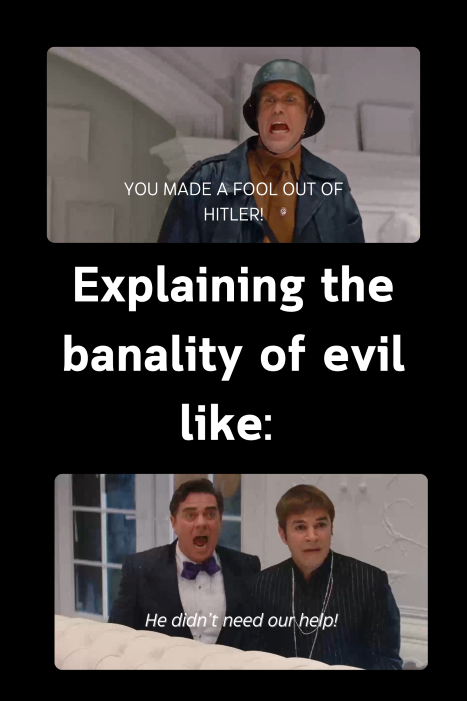

· By Caroline Black
How to Laugh Evil in the Face--with Philosophy!

With the U.S. elections finally decided, we've become unnerved. Times seem more uncertain than ever. Some of us are genuinely afraid for our future, for our friends, and for ourselves. And this is legitimate. The world around us is not what we once thought it was. We wonder about compassion, empathy, and existence.
And this is where philosophy and humor (two hallmarks of our brand, mind you) come in. Taking a page out of Nietzsche's book and staring the abyss straight in the face can be terrifying. And while the possibility of living in a meaningless world comes at us faster than a viral video, philosophers like Hannah Arendt know that evil isn't packaged very differently from anything else.
Making a Fool Out of Hitler
Using two screenshots from Mel Brooks' "The Producers" (2005), today's meme highlights the critiquing power of humor in moments of despair and oppression. A movie based off a musical that was based off an older movie, "The Producers" tells the story of a washed up theater producer and an accountant who attempt to make a flop of a show and capitalize on its failure by running off with the backers' money. Considering what to adapt as a musical, Max Bialystock and Leo Bloom pick a play about Hitler, written by zealous former Nazi Franz Liebkind.
This can't go wrong, the two colleagues reason. Everyone will see the musical love letter to Nazi Germany and be disgusted. Unfortunately for the duo, Liebkind (shortlisted for the part of Hitler) injures himself, and they are left with the flamboyant director Roger De Bris for the role. When De Bris makes his acting debut on the stage, the affronted audience returns to their seats and roars with laughter.
A tough subject for viewers at the time of its 1967 original release, "The Producers" looks the ultimate evil of Adolf Hitler in the face and sticks out its tongue in defiance and mockery.
Arendt's "Banality of Evil"
According to Hannah Arendt (1906-1975), one of the 20th century's greatest political thinkers, when we look evil in the face, we do not see anything drastically different from ourselves. Arendt, a German Jewish scholar educated with some of the brightest minds of her time, had to flee Germany in 1933. In 1941, she arrived in the United States, where she would spend the rest of her life.
Known for her work on totalitarianism, Arendt published a book on the trial of Adolf Eichmann, a prominent Nazi general who fled to Argentina when things went south for Germany. Looking at Eichmann, a very ordinary bureaucratic type, Arendt was at first surprised to see no raging monster, no malevolent sociopath. To Arendt, Eichmann's evil was more mundane in that he did not stop to self-reflect. He thought only of climbing the Nazi social ladder and getting the business of genocide done.
To Arendt, the essence of a person lies in their ability to self-reflect and, more importantly, act. The most important part of the philosophical life is not simply thinking about the deepest stuff, or spending your life holed up in a library (though, we wouldn't say no...). It's about how thought spurs action.
In satire, we make fools out of those in power, but they don't need our help. The complacency of people who hobnob with the powerful simply maintains and emphasizes a status quo that can end up evil. Thinkers like Arendt challenge the idea that true evil is obvious, is somehow easily defined, and is radical and demonic. It is not difficult for "Just doin' my job!" to escalate to participation in atrocities.
Hiding Behind the Couch (but Empowered!)
And so we return to Roger De Bris and his personal assistant, Carmen Ghia, hiding behind a couch to escape the wrath of a furious Franz Liebkind. Preparing to run for their lives, they can still quip that Hitler did not need their help to be treated like someone to be laughed at.
By now, most of us netizens know about Godwin's law, the idea that every online debate eventually returns to discussions of Hitler as some sort of moral measurement, a comparison the originator of the law believed would result in devaluing the events of the Holocaust. And we've all been there. Who hasn't heard someone say, "Well, at least he's not Hitler"?
But Arendt's point in speaking of evil as a "banal" thing, an everyday, thoughtless characteristic, shows us that evil actions do not come out of shadowy monsters. They come out of the minds and hearts of human beings with families, lives, and priorities. In saying this, we do not demean the suffering of 6 million Jews and countless other people.
Instead, we equip ourselves with the knowledge that, since they are only human beings, we can use our own voices and our own actions to diminish their power, critique it, and dismantle it. So yes, we can still ridicule Trump and his more powerful supporters. We can look our own governments in the face and laugh. When we see that what scares us is just another human, we can bravely speak out even when we have to dive behind the couch.
And that is how you can use philosophy to laugh evil in the face.
Apparel for Your Revolution
This holiday season, bring the spirit of revolution to your celebrations! Perfectly timed for the end of the election frenzy, our collection fuses Orwellian insight with a dash of Marxist wit to create gifts that make you think—and laugh. From mugs that ask if "Big Brother" is watching to cozy sweaters sporting Marx’s most memorable quotes, our merch is crafted for those who know that "history repeats itself, first as tragedy, then as farce." Make a statement this Christmas with gifts that challenge, inspire, and add a hint of rebellion under the tree!










